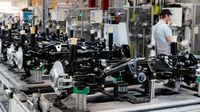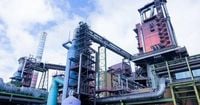Thyssenkrupp, the German industrial giant, has announced the closure of its spring manufacturing plant in Hagen-Hohenlimburg, a decision that will affect around 300 employees. The announcement, made on April 30, 2025, comes as part of the company's efforts to stabilize its Springs and Stabilizers business unit amidst a challenging economic environment in the automotive sector.
Mario Gropp, the head of the Springs and Stabilizers division, stated, "The closure of the Hagen production site is the only responsible solution to sustainably stabilize the Business Unit Springs and Stabilizers in a difficult environment." The plant, which has been significantly underutilized due to a persistently weak automotive economy in Europe, is expected to gradually cease operations over the next two years.
The reasons cited for this difficult decision include the ongoing downturn in the automotive market, sharply rising energy prices, and high labor costs, which have severely impacted the competitiveness of the Hagen site. Thyssenkrupp has also noted that competition from China, where production costs are significantly lower, has led to a decrease in orders in recent years.
This closure is not an isolated event in the automotive supply industry. Thyssenkrupp is not the first supplier in North Rhine-Westphalia to face such challenges, as many others are also navigating similar economic pressures. The company has indicated that it will engage in discussions to ensure a socially responsible reduction of jobs, with plans to retain approximately 30 to 40 positions at the Hagen site.
The situation reflects broader trends within the automotive industry, which has been grappling with declining sales and profitability. In the first quarter of 2025, profits for major manufacturers like Volkswagen and Mercedes have plummeted, with Volkswagen reporting a nearly 41 percent drop to 2.19 billion euros and Mercedes seeing a reduction of over 40 percent to 2.3 billion euros.
Thyssenkrupp's decision to close the Hagen plant is part of a larger strategy to divest from its Springs and Stabilizers business unit. The company is currently in discussions to sell this segment, which includes the Hagen facility and an associated Competence Center that focuses on product development and prototype testing.
Despite the impending closure, Thyssenkrupp has emphasized that it is committed to finding a viable path forward for its employees and the business unit. The company plans to conduct sales negotiations concurrently with the closure process, aiming to minimize the impact on its workforce.
The automotive sector's struggles are not unique to Thyssenkrupp. Other companies, such as ZF Friedrichshafen, have also announced significant job cuts, with plans to reduce their workforce by 11,000 to 14,000 positions in Germany by the end of 2024. This wave of layoffs and plant closures underscores the ongoing turmoil in the automotive supply chain, as manufacturers and suppliers alike grapple with a complex mix of economic challenges.
The closure of the Hagen plant marks a significant shift for Thyssenkrupp, which has been a key player in the automotive supply industry for many years. The company's decision reflects not only the current economic realities but also a strategic pivot towards focusing on more sustainable and profitable business operations.
As Thyssenkrupp moves forward with its plans, the impact of these changes will be felt not only by the employees directly affected but also by the broader community in Hagen and the surrounding region. The company has expressed its intention to work closely with local stakeholders to address the challenges posed by this transition.
In conclusion, the closure of the Thyssenkrupp plant in Hagen is emblematic of the broader struggles facing the automotive industry in Europe. As the market continues to evolve, companies will need to adapt to maintain competitiveness and ensure the sustainability of their operations.






